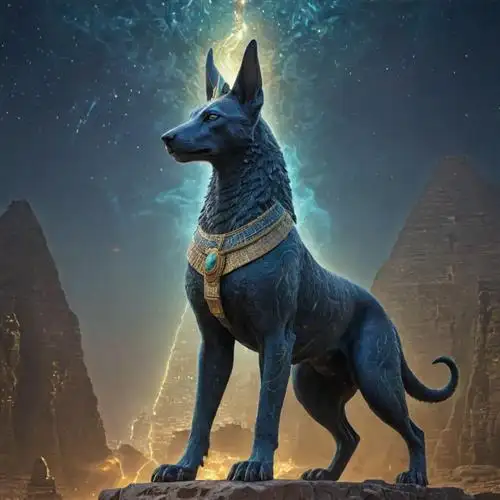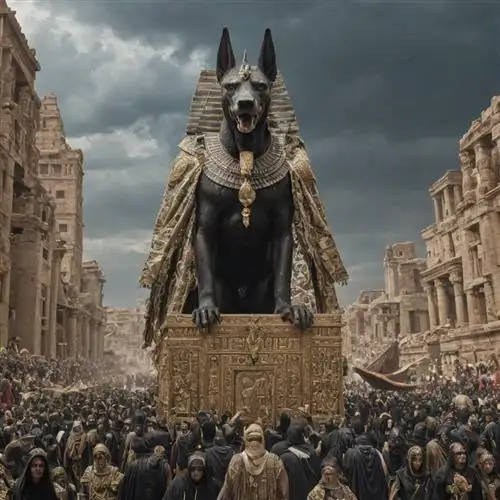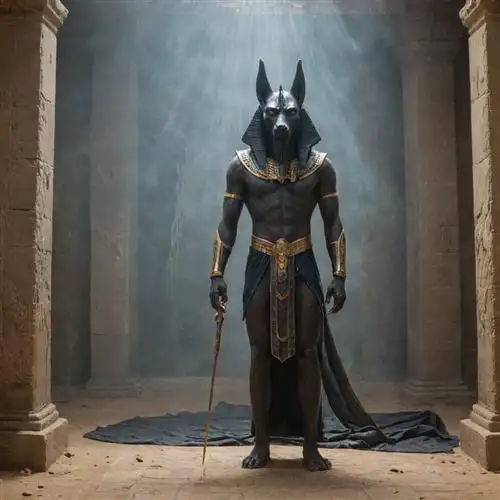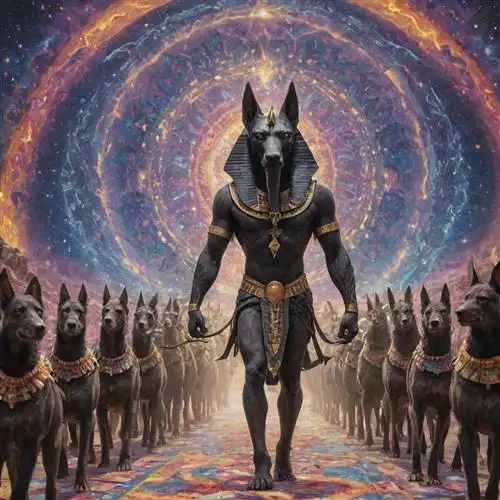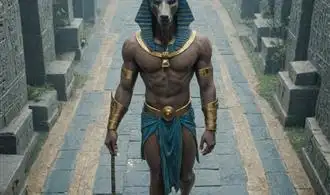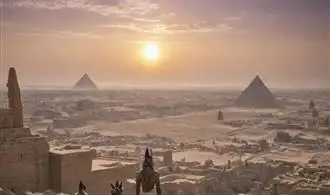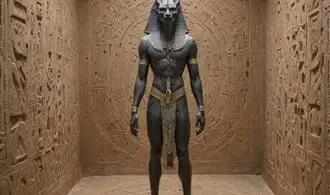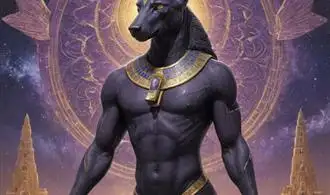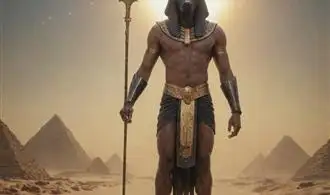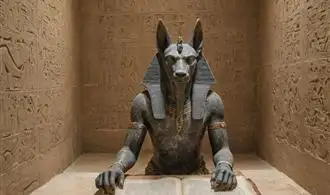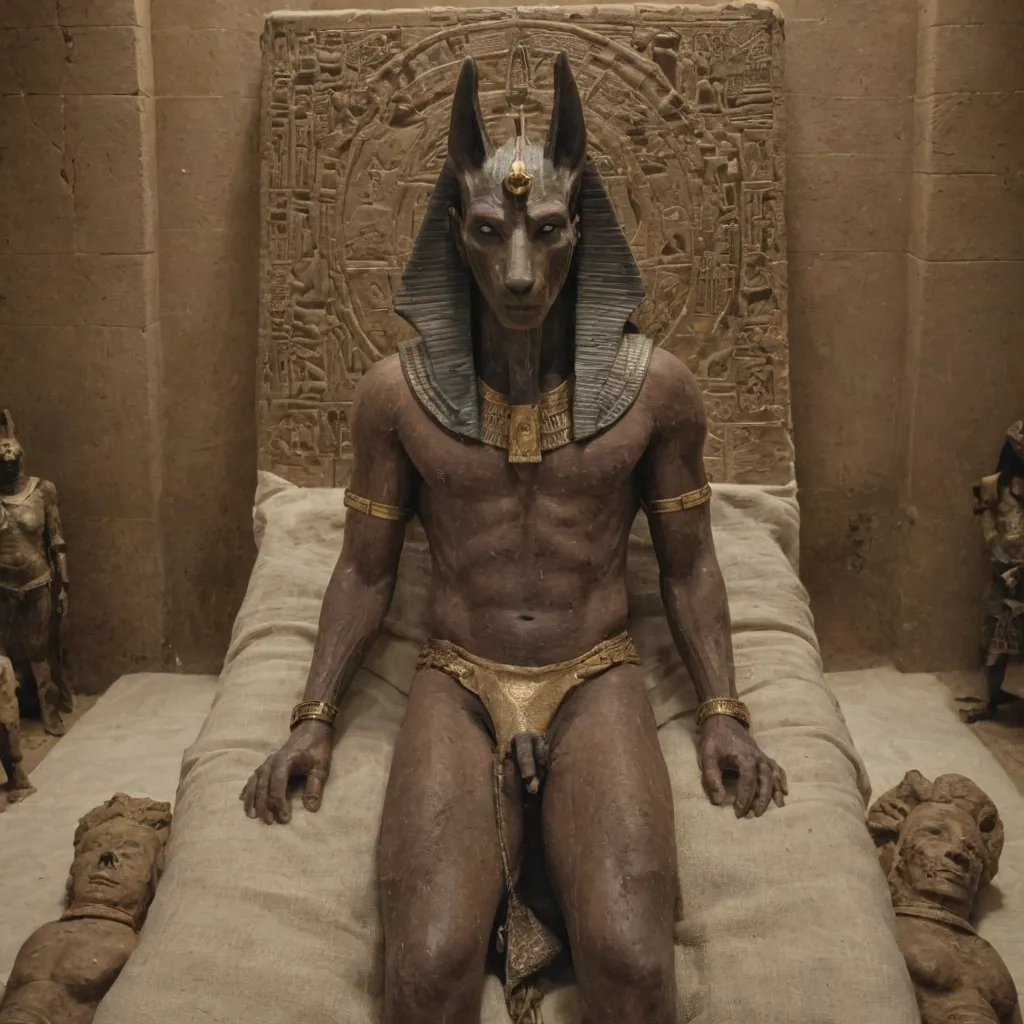
Anubis Jackal Symbolism
The jackal-headed deity Anubis holds deep significance in ancient Egyptian mythology and spirituality. This enigmatic figure, often depicted as a man with the head of a jackal or wild dog, represents much more than a simple animal association. Delving into the symbolism and meaning behind Anubis' jackal-like form reveals a complex and multifaceted representation of death, the afterlife, and the integral role this deity played in the ancient Egyptian worldview.
Jackals were revered in ancient Egypt for their association with the necropolis, or city of the dead. These cunning canines were known to prowl the edges of the desert, where the tombs and necropolises of the deceased were located. Their presence at the borders between the inhabited world and the realm of the dead made jackals symbolic guides and protectors of the dead. Anubis, as the jackal-headed god, was thus seen as the gatekeeper and guardian of the afterlife, responsible for the crucial transition from life to death.
The jackal's ability to navigate the liminal spaces between the living and the dead also imbued Anubis with the power to oversee the mummification process and the judgment of the dead. As the god who presided over the weighing of the heart ceremony, Anubis played a vital role in determining the fate of the deceased. His jackal-like form was believed to grant him keen senses and intuition, allowing him to discern the truth and ensure the deceased were worthy of entering the afterlife.
Moreover, the jackal's reputation as a cunning and adaptable creature also contributed to Anubis' symbolic significance. Jackals were seen as resilient, resourceful animals that could thrive in the harsh desert environment. This ability to navigate the challenges of the physical world mirrored Anubis' role as a guide and protector for the deceased, helping them navigate the treacherous journey to the afterlife.
In addition to his association with death and the afterlife, Anubis' jackal-like form also carried broader symbolic meanings. Jackals were revered for their keen senses, foresight, and instinctual intelligence. These qualities were attributed to Anubis, making him a deity of wisdom, intuition, and divine knowledge. The jackal's nocturnal nature also linked Anubis to the mysteries of the night and the unseen realms of the spiritual world.
Anubis Funerary Rites
Anubis Funerary Rites: Unveiling the Mysteries of the Jackal-Headed God's Role in Ancient Egyptian Burials
Anubis, the enigmatic jackal-headed deity, held a paramount position in the intricate tapestry of ancient Egyptian funerary rites. As the god responsible for the embalming process and the protection of the dead, Anubis' role was pivotal in ensuring the successful transition of the deceased into the afterlife. Understanding the depth and significance of Anubis' involvement in these rituals is crucial for anyone seeking to interpret Anubis depictions accurately.
At the heart of Anubis' funerary responsibilities was the mummification process. The ancient Egyptians believed that proper preservation of the body was essential for the soul's continued existence in the afterlife. Anubis, as the god of embalming, was tasked with overseeing this complex and meticulous procedure. From the removal of the internal organs to the careful wrapping of the body in linen, Anubis ensured that the deceased was prepared for their eternal journey.
But Anubis' role extended far beyond the physical aspect of burial. The jackal-headed god was also responsible for guiding the deceased through the treacherous underworld, ensuring their safe passage to the realm of the dead. In this capacity, Anubis was often depicted standing vigilantly at the entrance to the afterlife, ready to welcome and protect the soul of the departed.
Equally significant was Anubis' role in the weighing of the heart ceremony, a pivotal moment in the ancient Egyptian conception of the afterlife. During this ritual, the heart of the deceased was weighed against the feather of Ma'at, the goddess of truth and justice. Anubis, as the overseer of this process, played a crucial role in determining the fate of the soul, ensuring that only the righteous were granted passage to the eternal paradise.
Anubis Guardianship
Anubis, the jackal-headed deity, was a central figure in ancient Egyptian mythology, renowned for his role as the guardian of the dead and the embalming process. This enigmatic god held immense significance, not just in the afterlife, but also in the daily rituals and beliefs of the Egyptian people. Understanding the multifaceted nature of Anubis's guardianship is crucial for those seeking to interpret his depictions accurately.
One of the primary responsibilities of Anubis was to oversee the mummification and burial of the deceased. As the patron of embalmers, he ensured the proper preparation of the body, guiding the process with his expertise and divine powers. This sacred duty was not only practical but also imbued with deep spiritual meaning, as the preservation of the physical form was vital for the soul's safe passage into the afterlife.
Beyond the realm of the dead, Anubis also served as a guardian of the living. He was believed to protect individuals from the dangers of the afterlife, guiding them through the treacherous underworld and ensuring their safe arrival in the realm of the gods. This protective role extended to the living, as Anubis was invoked to safeguard the living from misfortune, illness, and other forms of harm.
Anubis's guardianship also manifested in his role as a psychopomp, or a guide of souls. He was responsible for weighing the heart of the deceased against the feather of truth, a crucial step in the judgment of the dead. This ritual, known as the "Weighing of the Heart," determined the fate of the soul, and Anubis's presence ensured the impartiality and accuracy of this process.
The iconography of Anubis, with his distinctive jackal-headed form, is a testament to the enduring significance of this deity in ancient Egyptian culture. His depictions often show him standing vigilantly, holding the tools of his trade, such as the crook and flail, or seated beside the mummified body of the deceased, guarding the transition into the afterlife.
Anubis Psychopomp Imagery
In ancient Egyptian mythology, Anubis is often depicted as a jackal-headed deity who served as the psychopomp, or guide of souls, during the afterlife. This specific iconography holds immense significance and provides valuable insights into the ancient Egyptians' beliefs and practices surrounding the passage from life to the hereafter.
The jackal-headed form of Anubis is believed to be a symbolic representation of the animal's role in the Egyptian funerary landscape. Jackals were often observed near burial sites, and their scavenging behavior was interpreted as a connection to the realm of the dead. By portraying Anubis with a jackal's head, the ancient Egyptians were emphasizing his association with the transition between the physical world and the afterlife.
Anubis' role as a psychopomp is primarily evident in his depiction presiding over the weighing of the heart ceremony, a critical step in the process of judgment and entrance into the afterlife. In this iconic scene, Anubis is shown standing beside the scales, carefully monitoring the balance between the deceased's heart and the feather of truth, representing the individual's moral and ethical deeds during their lifetime.
Additionally, Anubis is often portrayed guiding the deceased through the various stages of the afterlife journey. He may be shown leading the dead into the underworld, or assisting in the mummification process, ensuring the proper preparation of the body for the transition to the next realm.
The symbolism behind Anubis' jackal-headed form extends beyond his role as a psychopomp. The jackal was also associated with the ability to navigate the liminal spaces between the living and the dead, making Anubis a powerful mediator between the two realms. This aspect of his iconography emphasizes his importance in the ancient Egyptian belief system, where the smooth passage of the soul was essential for the deceased to achieve a successful afterlife.
Anubis Mummification Rites
The role of Anubis, the jackal-headed Egyptian deity, in the mummification process was paramount. As the god associated with embalming, Anubis oversaw the intricate and sacred rituals that transformed the deceased into an eternal, otherworldly being. Understanding the significance of Anubis' involvement in these rites is crucial for interpreting the rich symbolism and meaning behind ancient Egyptian funerary practices.
At the heart of the mummification process was the opening of the mouth ceremony, known as the "per aakh" or "coming forth by day" ritual. This ritual was believed to restore the deceased's ability to speak, breathe, and partake in the afterlife. Anubis played a central role in this ceremony, as he was responsible for the preparation and purification of the body, as well as the final stage of mummification.
The mummification process itself was a complex and multi-stage affair, with Anubis presiding over each step. The body was first cleansed and purified, often with natron, a naturally occurring salt. Anubis would then carefully remove the internal organs, which were placed in canopic jars under the protection of his four sons: Imsety, Hapy, Duamutef, and Qebehsenuef.
The brain was often removed through the nose, a delicate procedure that required great skill and precision. Anubis was believed to guide the embalmers in this task, ensuring the preservation of the body for the journey to the afterlife. The body was then wrapped in linen, with amulets and talismans placed strategically to protect and empower the deceased.
Anubis' role extended beyond the physical preparation of the body. He was also responsible for the spiritual aspects of the mummification process, guiding the deceased through the dangerous underworld and ensuring their safe passage to the afterworld. This connection to the afterlife was reinforced through the presence of Anubis statues and images within the tomb, serving as a constant reminder of the god's protection and guidance.

